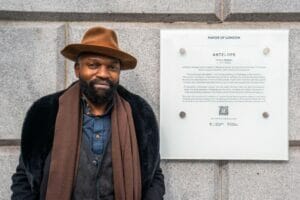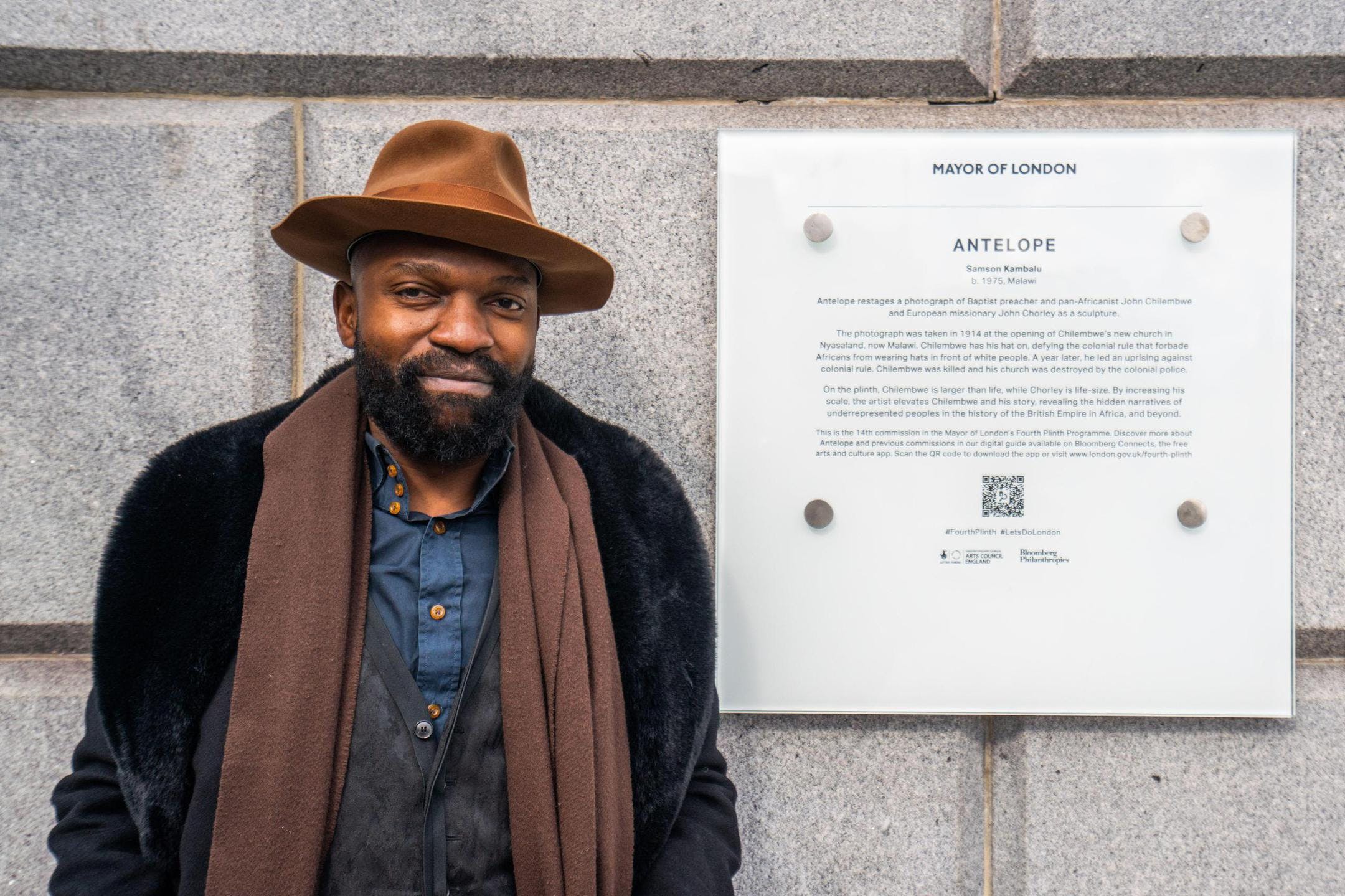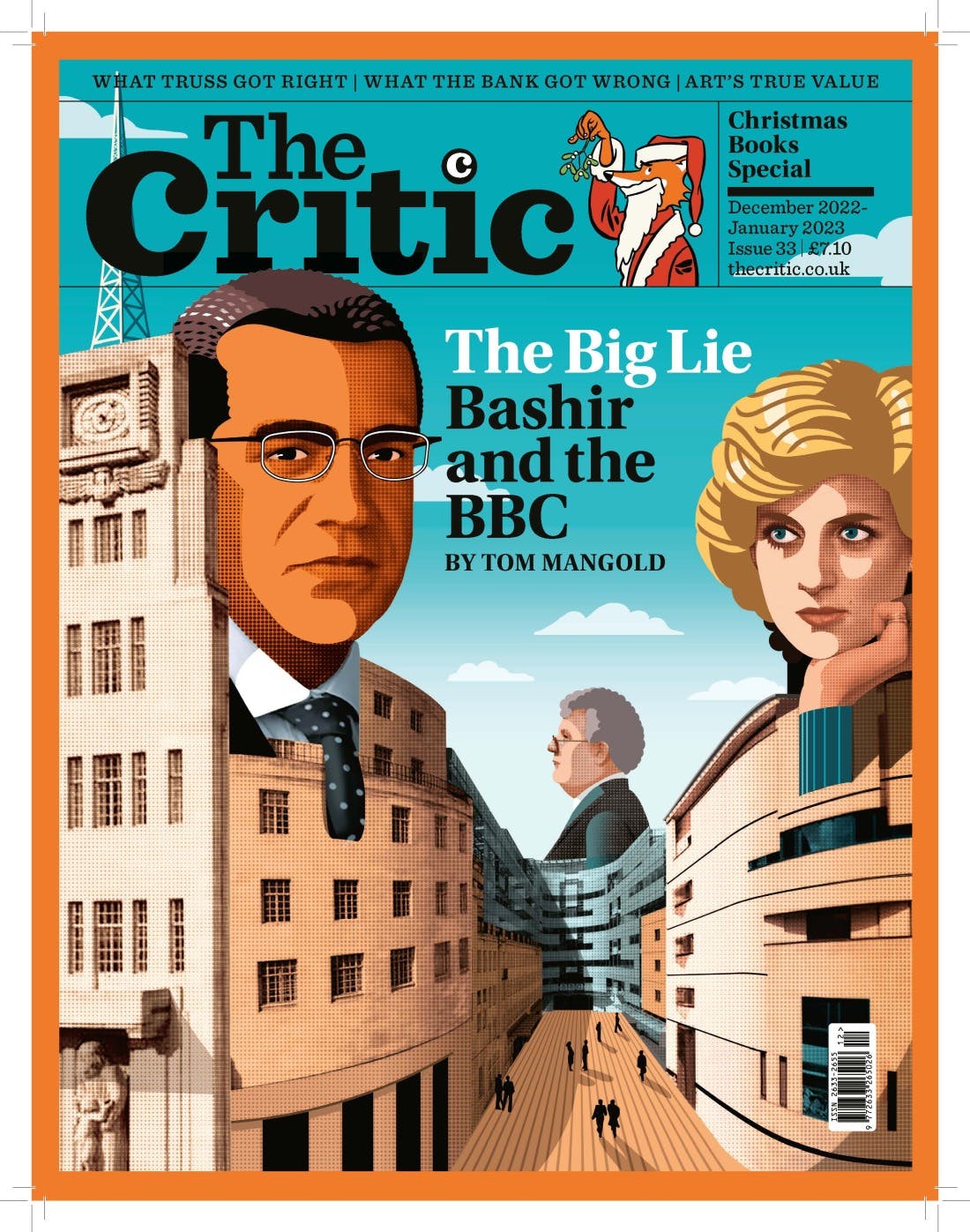
This article is taken from the December/January 2023 issue of The Critic. To get the full magazine why not subscribe? Right now we’re offering five issues for just £10.
I very much like antelope, the new installation on Trafalgar Square’s Fourth Plinth which sets the Malawian anti-colonial rebel John Chilembwe face-to-face with those full-blooded heroes of empire Nelson, Napier and Havelock. It echoes the tradition of conciliatory statue pairings found elsewhere in London, from Cromwell and Charles I to Churchill and Gandhi.

It is the work of Samson Kambalu, a professor of contemporary art at Oxford, and was chosen in the wake of Black Lives Matter and the toppling of Edward Colston as an obvious salvo in the culture wars. However, in a surprising gesture, Kambalu has actually set two statues on the plinth. The second is of a British missionary, John Chorley, who was Chilembwe’s friend, but here stands for more than that. Men like him eradicated slavery from Malawi, brought stability to the region, and then devoted their lives to its improvement. Antelope invites honest discussion of this complex period: there are two sides to every story, Chilembwe and Chorley together remind us.
Unfortunately, media commentary — perhaps taking a lead from the official guide to the statues — peddle the same clichés and misinformation that this is a story of black and white, good and evil, and another reason to disparage Britain’s past.
Reading any of them, you would conclude that Chilembwe’s 1915 rebellion tapped into widespread discontent in colonial Malawi. The evidence does not support that assumption. Chilembwe was an exceptional figure, in many ways ahead of his time. Despite ten years of fomenting unrest, he succeeded only in inciting a few hundred followers to rebel. More indigenous people welcomed — or even participated in — efforts to suppress the rising than ever joined Chilembwe.
Chilembwe was remembered for his courage and defiance, but his methods were not emulated
The British were not only tolerated in Malawi; for a long time they enjoyed considerable loyalty from the local population. Before they established a protectorate in 1891, the region was at the heart of the vast Indian Ocean slave trade. Its peoples had been predated upon for centuries by Arabs, their Islamised African accomplices and, latterly, marauding tribes of the Zulu diaspora, and the Portuguese. With very little force, the British established peace and extirpated slavery, mainly through the efforts of missionaries. The memory of all this was still fresh when Chilembwe launched his rebellion. Indeed his own mother had been a slave, his father her captor.
With peace and stability, there emerged an immense appetite for education, which the missionaries fed at institutions of astonishing ambition. For a period, Malawi had one of the best-educated populations on the continent, and an explicit goal throughout was to equip the country with leaders of its own. These soon emerged, conscientious men and women who worked peacefully towards independence, achieved in 1964. These pioneers have often been overshadowed by Chilembwe’s flash in the pan.
Chilembwe was remembered for his courage and defiance, but his methods were not emulated. Veneration came in the post-colonial period, when sanguinary heroes were in demand. Even then, the praise of Malawi’s notorious and eccentric president Hastings Kamuzu Band was faint: during his 30-year rule, Chilembwe was commemorated with a postage stamp. Only after Banda’s downfall in 1994 did “Chilembwe Day” become a national holiday, as Malawi’s new government looked for ways to supplant the cult of the old regime.
Is Chilembwe then undeserving of our attention? On the contrary, his story is highly instructive, but it is dark and ambiguous, quite unlike the simplistic fable that has recently been propagated.
Chilembwe’s career began as the servant and protégé of Joseph Booth, an itinerant English born-again Christian, who evangelised as a pacifist, anti-colonialist missionary. Booth claimed to have coined the phrase “Africa for the Africans”; he also introduced Chilembwe to a millenarian American church that claimed the Day of Judgement would occur in 1915.
Livingstone was decapitated in front of his wife and children
Booth took Chilembwe to the United States, where they were both feted by Black American churches, and Chilembwe was sponsored to study in a Baptist seminary. When he returned to Malawi two years later as a minister, he clearly felt a sense of alienation. His radical ideas put him at odds with colonial society and also with his own “benighted” people, of whom he often wrote with disdain. As he contemplated marriage, he observed that “the ordinary African woman in her heathen state is ignorant, uninteresting, and unlovable”. (His wife Ida seems to have been of mixed Portuguese and African heritage.)
Chilembwe founded his own mission and, for a time, prospered. Some European missionaries were suspicious and contemptuous of his efforts, but others were supportive. Even his sermonising against white society was tolerated for over a decade until the Germans invaded from Tanzania in 1914. When Chilembwe denounced the British war effort, the government decided to deport him, and it was then that he incited his congregation to rebellion.
His followers attacked the homes of two plantation managers and an arms depot in the nearby town. In total, they killed two local Malawians and three Europeans.
One of the victims was William Jervis Livingstone, a neighbour with whom Chilembwe had long feuded, and whom he identified in his sermons as the Antichrist. Livingstone was decapitated in front of his wife and children, and his head set on a pole, beneath which Chilembwe conducted a church service the next day.
The rebels later attacked a nearby mission, but found it evacuated except for one priest who had stayed behind to tend a sick child. They tried to stab him to death, but he recovered from his wounds. Within a few days, government forces regained control and the rebellion petered out. Chilembwe fled into the forest, where he was shot dead by askaris. A total of 46 of his followers were later executed, and 300 received prison sentences. Life then went on much as before.
In an otherwise detailed discussion, the official guide to the statues mentions none of this. Nor does it note that Chilembwe appealed to the Germans for alliance shortly before his death, but this is important. Ten years previously, the Germans had suppressed an uprising in their vast colony to the north by killing perhaps as many as 300,000 people. “Maji Maji” was a massive rebellion that united disparate tribes against a regime that was universally detested. Chilembwe’s was nothing of the sort.
The rebels in Malawi experienced oppression mainly through a system of labour extortion called thangata. White settlers — many of whom had acquired land dishonestly — offered tenancy to Africans in exchange for labour. Once installed, the terms were twisted, corporal punishment was commonly administered, and workers faced eviction if they did not comply with landowners’ demands. It was so cruel and exploitative that one missionary denounced it as “the yoke of a new slaver”.
Yet it was importantly different from the slavery that preceded it. Europeans took some of the best land for themselves, but only a small proportion of the whole. The country did not become a settler colony like Kenya or Rhodesia.
We cannot be really sorry for what was done unless we know the truth of it
The predominant shortage was of labour, not of land, and while workers endured appalling hardships, they could exercise some choice. Most labourers on white-owned estates were economic migrants from neighbouring Mozambique, who continued to “vote with their feet” long after Chilembwe’s rebellion. “This place is wonderful” ran the refrain of a popular song from the period, which was still being sung into the 1980s, in memory of conditions under British rule. Nevertheless many were treated badly, and it was from this unsettled and misused population that Chilembwe drew mos 2212 19 Feat Moynihan t of his support.
Kambalu’s statues are intended to “reveal the hidden narratives of under-represented peoples”, insists the plaque appended to the plinth by the Mayor of London’s team. And it is an excellent thing to be reminded of John Chilembwe, and the racism and rapacity which he opposed. But there are other under-represented people in this story, most notably the missionaries. So many sacrificed their lives for the betterment of the region, but few in Britain remember them today.
Charles mackenzie was buried in a hastily dug grave following a disastrous early attempt at armed confrontation with the slavers. His successors operated mainly through a heroic appeal to better nature.
William Johnson was an Oxford graduate who spent his whole life wandering the shores of Lake Malawi, preaching peace on earth and goodwill to all men, patiently winning the trust of hostile tribes. David Clement Scott championed the indigenous culture, fostered African church leaders, and fought white settlers for the rights of local people. He lost his wife, brother and young son to fever, before dying himself.
Robert Laws, the son of an Aberdeen cabinet maker, insisted on the highest possible education being offered to Africans. His Overtoun Institute produced independent-minded graduates who shaped politics not just in Malawi, but throughout southern Africa.
Not under-represented but misrepresented is John Chorley, a friend to Chilembwe, and by all accounts a decent man. Little else is known about him, but the official guide to the statues claims that he only supported Chilembwe for money. There is no evidence for this, and the story on which it is based actually relates Chorley’s surprise when Chilembwe offered him his congregation’s collection to help with repairs on his church. It is a trivial detail, but the distortion is dishonest and malevolent, and diminishes the authority of Kambalu’s work.
Chilembwe and Chorley are shown wearing hats, which Kambalu (in his otherwise excellent autobiography The Jive Talker) has claimed was illegal for Africans in colonial Malawi. When I challenged him on this via Twitter, he conceded that it was not illegal but “forbidden”: many whites insisted that Africans remove hats in their presence. Within a few hours of our exchange, the BBC’s article on the statues was quietly changed to reflect this.
Hats were certainly a contentious issue, and commissioners at the official enquiry into the rebellion were bewildered that so many witnesses raised the subject. Some of their stories are harrowing: prosperous, educated Malawians who sought to emulate the style of their white counterparts by dressing formally often found themselves laughed at and abused. Some had been threatened with violence and insulted with the worst racist slurs for not removing their hats.
It was pointed out that Africans had recourse to law if they were mistreated in this way. But clearly it did not work in practice. The veteran Scots missionary Alexander Hetherwick pointedly averred that black and white should both raise their hats “because it shows two gentlemen have met and not just one”. But his view was not shared by everyone; nastiness and belittling were widespread.
The situation was worse than illegality, Kambalu commented in his exchange with me, and he may well be right. But that is all the more reason to report the facts accurately. It seems worth asking which is worse, a society that enshrines racism in petty legislation, such as apartheid South Africa, or one where it lurks insidiously under the radar, as in colonial Malawi?
The real damage of colonialism, Frantz Fanon famously argued, was psychological, and the hats issue is an interesting example of this. The British were respected, but when Malawians tried to emulate them, their efforts were spat back in their faces. That is a story of racism far more compelling than the unnecessary fabrications that have been circulated.
We cannot be really sorry for what was done unless we know the truth of it. But ideologues dislike the truth because it often throws up something inconvenient, like a shared history that might arouse pride as well as shame. So instead we get caricatures, which feed our undeserved sense of superiority over the past. Kambalu’s thoughtful, generous work deserves better than this.
Enjoying The Critic online? It’s even better in print
Try five issues of Britain’s newest magazine for £10

